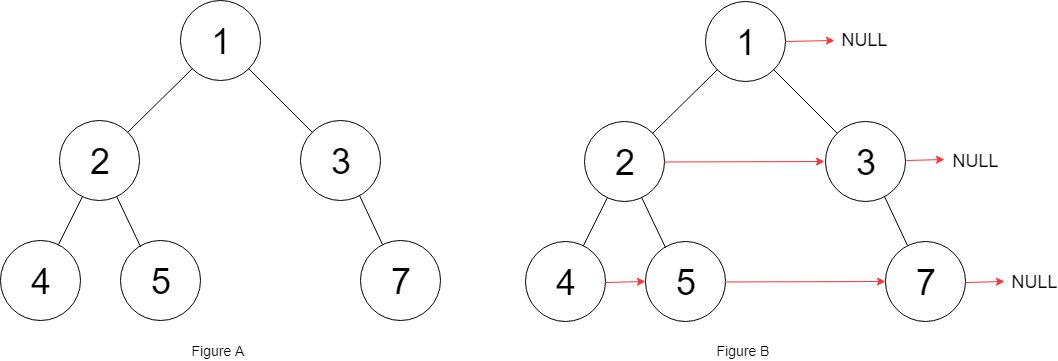LeetCode in Kotlin
117. Populating Next Right Pointers in Each Node II
Medium
Given a binary tree
struct Node { int val; Node *left; Node *right; Node *next; }
Populate each next pointer to point to its next right node. If there is no next right node, the next pointer should be set to NULL.
Initially, all next pointers are set to NULL.
Example 1:

Input: root = [1,2,3,4,5,null,7]
Output: [1,#,2,3,#,4,5,7,#]
Explanation: Given the above binary tree (Figure A), your function should populate each next pointer to point to its next right node, just like in Figure B. The serialized output is in level order as connected by the next pointers, with ‘#’ signifying the end of each level.
Example 2:
Input: root = []
Output: []
Constraints:
- The number of nodes in the tree is in the range
[0, 6000]. -100 <= Node.val <= 100
Follow-up:
- You may only use constant extra space.
- The recursive approach is fine. You may assume implicit stack space does not count as extra space for this problem.
Solution
import com_github_leetcode.left_right.Node
import java.util.LinkedList
import java.util.Queue
/*
* Definition for a Node.
* class Node(var `val`: Int) {
* var left: Node? = null
* var right: Node? = null
* var next: Node? = null
* }
*/
class Solution {
fun connect(root: Node?): Node? {
if (root == null) return null
val bfsQueue: Queue<Node> = LinkedList()
bfsQueue.offer(root)
root.next = null
var temp: Node?
var prev: Node?
while (bfsQueue.isNotEmpty()) {
val size = bfsQueue.size
prev = null
for (j in 0 until size) {
temp = bfsQueue.poll()
if (prev != null) prev.next = temp
if (temp!!.left != null) bfsQueue.offer(temp.left)
if (temp.right != null) bfsQueue.offer(temp.right)
prev = temp
}
}
return root
}
}

